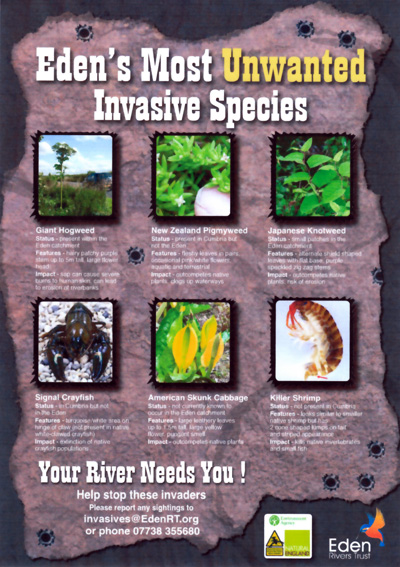A poster and leaflet campaign has been launched by Eden Rivers Trust to highlight some of ‘Eden’s Most Unwanted’ animals and plants -and this includes some species already present in the Eden Valley, as well as others which have not yet arrived.
 These introduced species, such as the killer shrimp and American signal crayfish, can wipe out our local river wildlife. The River Eden is fortunate in that these particular animals have not yet arrived, and it has far fewer invasive species associated with it than many other rivers. But it is vital that we prevent such harmful new species from being accidently introduced. Raising awareness of which species can be invasive and the impacts that they can have is a major tool in preventing their movement.
These introduced species, such as the killer shrimp and American signal crayfish, can wipe out our local river wildlife. The River Eden is fortunate in that these particular animals have not yet arrived, and it has far fewer invasive species associated with it than many other rivers. But it is vital that we prevent such harmful new species from being accidently introduced. Raising awareness of which species can be invasive and the impacts that they can have is a major tool in preventing their movement.
A series of events have been organised to control invasive plants like Himalayan balsam and Japanese knotweed which are already damaging our rivers. The events are part of plans drawn up by the Eden Invasives Species Steering Group which was set up in 2012 to coordinate action against unwelcome plants and animals. It consists of local land owners, organisations and volunteers.
This year it has been agreed that efforts to control Himalayan balsam should continue at the five demonstration sites set up last year at Ullswater, Lazonby, Armathwaite, Dalston and Carlisle. Balsam control will also be expanded in to the headwaters of the affected rivers. Starting work at the furthest upstream point that balsam occurs will enable maximum benefit to be gained. It should be possible to stop the advance of Himalayan balsam and, over time, we may be able to start pushing it back down the river valleys.
Effective action will only be possible with assistance from local communities and the Trust is encouraging volunteers to join them for balsam bashing days. Dates for the many organised events can be found on the Eden Rivers Trust website HERE
To tackle another non-native invasive plant, Japanese knotweed, the Trust has invested in stem injection kits which enable very effective, targeted herbicide delivery directly into the hollow stems of these plants. These have been funded by the Cumbria Community Foundation.
Paul Greaves, Invasive Species Officer for Eden Rivers Trust, said:
“We would like to remind everyone using waterways for recreation of the “Check Clean Dry” message! Please check, clean and dry your equipment before moving from one river or lake to another. Angling nets, kayaks, felt-soled waders, boats and wetsuits are all pieces of equipment that could transport unwanted “hitchhikers” in to the River Eden system.”
The Trust would like people to email reports of Japanese knotweed and giant hogweed to Paul Greaves, Invasive Species Officer at invasives@EdenRT.org
If you would like to report any other invasive species this can be done via the South Cumbria Rivers Trust website HERE










